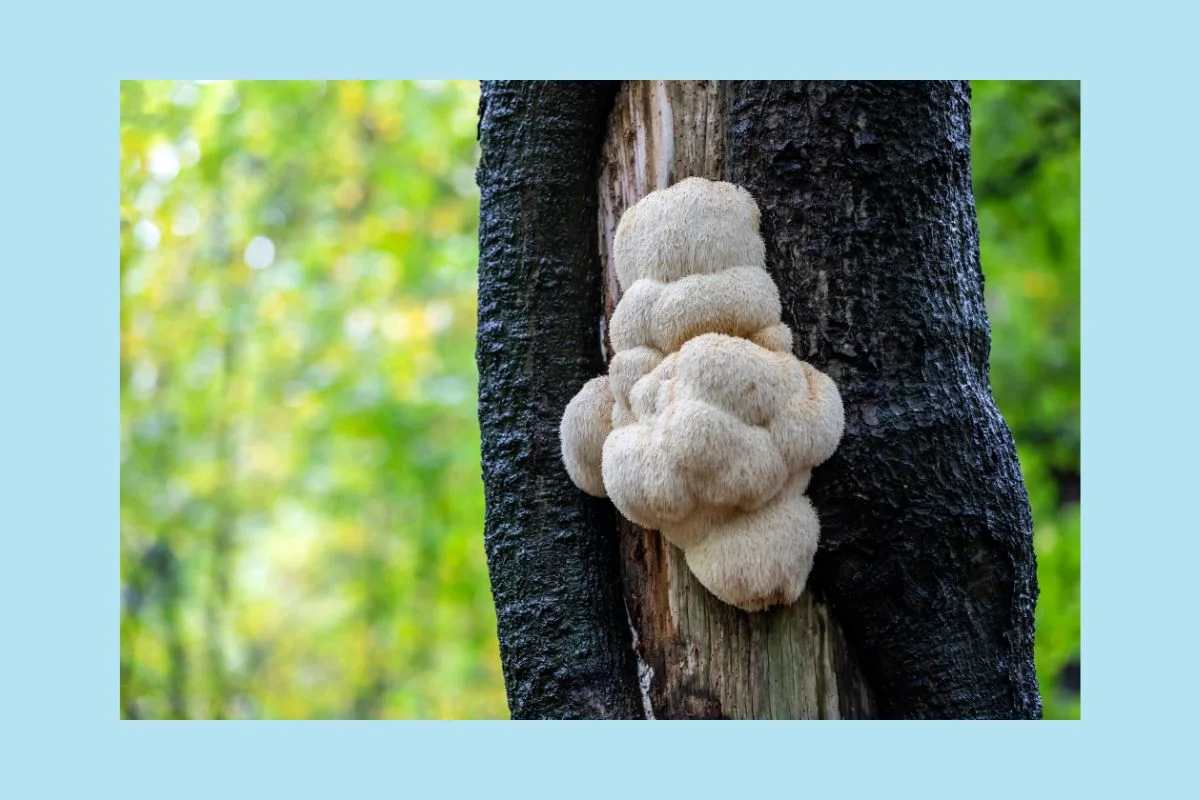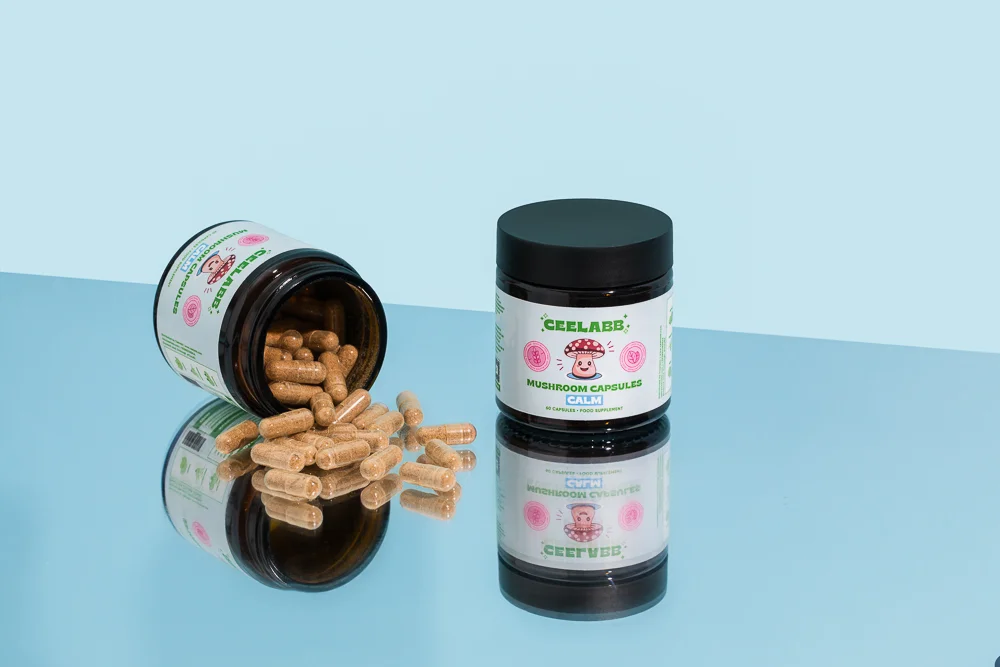Free Shipping on all Orders over €70 in Ireland
Exploring 6 Potential benefits and side effects of Lions Mane Mushrooms

let’s talk Lions Mane, Do you struggle with anxiety, sleeping issues, stress, ADHD, Menopause or depression? If so, you’re not alone. Many people face these everyday struggles, But what if there was a natural solution that could help? allow me to introduce Lion’s Mane mushrooms. These fascinating fuzzy fungi have gained attention for all the right reasons and their potential benefits in addressing these common issues. In this blog, we’ll explore the potential benefits and side effects of Lion’s Mane mushrooms, diving into how they could help sooth some of the pain points you face daily. So, if you’re curious to learn more about this intriguing mushroom and its potential to support your overall well-being, keep reading.
wHAT IS LIONS MANE ?
Lion’s Mane also known as Hericium erinaceus, is a distinctive and fascinating fungus that has a long history and origin ingrained in Asian cultures. it gets its name because it resembles a lion’s mane. This magical fuzzy mushroom has been used for centuries in traditional Chinese and Japanese medicine for its potential health benefits. However, In the kitchen, Lion’s Mane mushrooms are popular for their delicate flavour and meaty texture, making them a popular ingredient in various culinary dishes. While further research is needed, Lion’s Mane mushrooms may potentially offer support for cognitive function, nerve regeneration, and immune system health.

IS LIONS MANE LEGAL IN IRELAND? is lions mane legal UK?
So the big question. Is Lions Mane legal in Ireland? Is Lions Mane legal UK?
just an FYI – if you come across one of those fluffy mushrooms growing naturally in the UK, they’re actually protected and you can’t pick them. It’s against the law according to Schedule 8 of the Wildlife and Countryside Act 1981. But no worries, it’s totally legal to grow your own or buy them in a health food store and enjoy them legally in the UK. Just avoid snatching them from the wild. Oh, and if you’re travelling abroad, make sure to double-check the rules because it’s not legal everywhere. in Ireland, you’re good to go – they allow the consumption and cultivation of Lion’s Mane.
is lions mane a drug?
No, lion’s mane is not a drug. It’s a type of mushroom that’s been used in traditional Chinese medicine for centuries. It is typically sold as a food supplement in capsules, powders, tinctures or teas or used fresh in cooking recipes.
appears to be safe and well tolerated, with very few adverse effects reported in clinical trials. However, more research is needed to confirm the benefits1
IS FRESH LIONS MANE BETTER THAN lions mane SUPPLEMENTS?
Lion’s mane mushrooms are hot for both foodies and brainpower seekers!
Foodies: Fresh lion’s mane is great for cooking (think vegan steak!), but cooking reduces its health benefits.
Brain Boosters: Extracts offer a more concentrated way to absorb those benefits, potentially helping with focus, stress, and mood.
Next up: different ways to extract the goodness from lion’s mane!
EXTRACTION METHOd
Imagine Lions Mane as a treasure chest full of health benefits we want to access. imagine the extraction methods as the ring of keys we use to unlock different parts of this magical fuzzy fungus.
Hot Water Extraction: This is like a powerful cup of lions mane tea. It targets specific compounds thought to be good for your brain, but it might miss some hidden gems that remain in the chest.
Alcohol Extraction: Think of this as a more forceful treasure hunt. Alcohol pulls out a wider range of compounds from the mushroom, by accessing more compounds you access enhanced benefits.
Dual Extraction: This is like using both hot water and alcohol keys to grab as much treasure as possible! You get a broader range of potential benefits.
Ultrasonic Cold Water Extraction: This is a high-tech tactic. Imagine using sound waves like a sonic screwdriver to gently crack open the mushroom’s cell walls and get all the good stuff out, without using heat that might damage other treasures. ( IE, the lions mane supplement )
Lions mane dosing guide
- While there is promising research on Lions mane mushrooms less commonly known as (Hericium erinaceus) for various conditions, there is no one-size-fits-all recommended dosage. Here’s a breakdown of what we currently know:
- Dosage varies by product: Lion’s mane supplements come in various forms (powders, capsules, extracts teas) with different potencies. Always follow the dosage instructions on the specific product you’re using
- Research proposes a range: Studies have used various dosages, typically ranging from 250mg to 1,000mg per day.
- Limited clinical data: Most research on Lion’s mane is in the very early stages, and lions mane dosage guides haven’t been established for specific conditions like stress, anxiety, ADHD, Sleep, Menopause, and depression.
What are the benefits of lion’s mane?
ANXIETY & STRESS
Lion’s Mane mushrooms have the potential to enhance cognitive function and boost overall well-being. According to a study conducted on mice, when given Lion’s Mane mushroom supplements, they showed reduced anxiety-like behaviors. This suggests that Lion’s Mane mushrooms could be beneficial in reducing both anxiety and stress. But we still need more studies to be sure about all these awesome benefits!2
lions mane ADHD
While lots of mushrooms like Cordyceps and Reishi are getting attention for focus and calming racing thoughts, Lion’s Mane seems to be the champion of brainy benefits. Here’s why:
Lion’s mane mushroom is known for its potential brain benefits, it may help individuals with ADHD. It contains bioactive compounds like beta-glucan polysaccharides, hericenones, and erinacine terpenoids, which are believed to have neuroprotective and neuroregenerative properties. These compounds have been associated with improved cognitive function, reduced symptoms of anxiety and depression
Lion’s Mane may have potential benefits for ADHD, but it’s important to consult with your doctor before incorporating it into your routine.3
sleep
Lion’s mane mushroom, also known as Hericium erinaceus, has been getting attention for its potential benefits in promoting relaxation and sleep. Early research using mice suggests that Hericium erinaceus mycelium may improve sleep quality and reduce anxiety, However, it’s important to note that this was a study on mice, and more research is needed to see if these effects translate to humans.4
menopause
It is thought that lion’s mane mushrooms may help Improve the quality of sleep and improve mood in women suffering from menopause. although more clinical studies are needed to confirm. these findings are promising.5
Depression
Good news! According to a study, lion’s mane mushrooms might bring some hope by helping to alleviate depression and anxiety symptoms in women. It seems that this culinary and medicinal fungus works in a different way than previously believed, although the exact cause is still unknown. Nonetheless, this discovery suggests that lion’s mane could be a useful tool for improving mood.6
potential side effects
Lion’s mane mushrooms are trendy for potential brainpower, but what’s the catch?
Lion’s mane mushroom seems to be well-tolerated in animal studies, with no negative effects even at high doses in rats. However, if you have allergies to mushrooms, it’s best to steer clear of it to avoid any potential allergic reactions.
- Before you dive in:
- Chat with your doctor, especially if you have health issues or take meds
- Research is still young on long-term use7
lions mane reviews
insert review later.

Best selling Ceelabb Mushroom Capsules
WHAT ARE MUSHROOM SUPPLEMENTS?
what are functional mushrooms?
Types of Mushroom Supplements
Concentrated forms of various mushroom species
Made from dried mushroom powder and extracts.
Potential Benefits of Mushroom Su…
Sources
- https://restorativemedicine.org/journal/neurological-activity-lions-mane-hericium-erinaceus/ ↩︎
- https://www.mdpi.com/2076-328X/12/7/235 ↩︎
- https://restorativemedicine.org/journal/neurological-activity-lions-mane-hericium-erinaceus/ ↩︎
- https://link.springer.com/article/10.1186/s12906-021-03463-3 ↩︎
- https://www.jstage.jst.go.jp/article/biomedres/31/4/31_4_231/_article/-char/ja/ ↩︎
- https://www.jstage.jst.go.jp/article/biomedres/31/4/31_4_231/_article/-char/ja/ ↩︎
- https://pubmed.ncbi.nlm.nih.gov/27816657/ ↩︎




